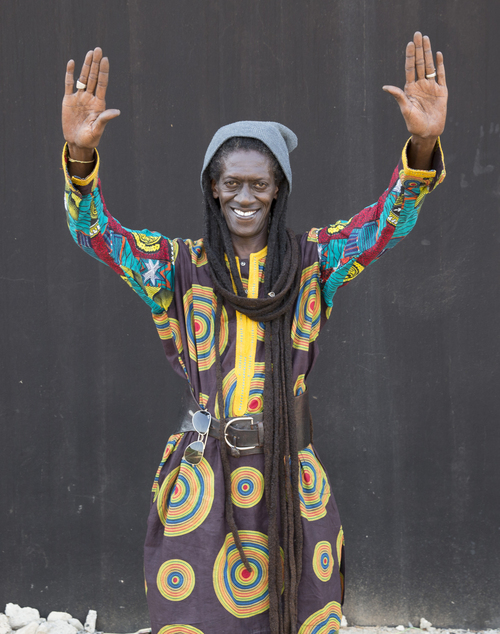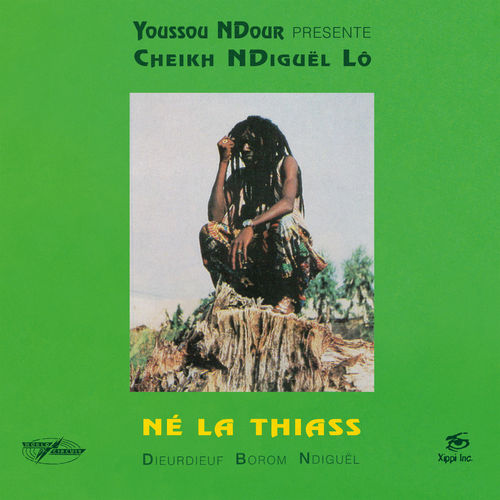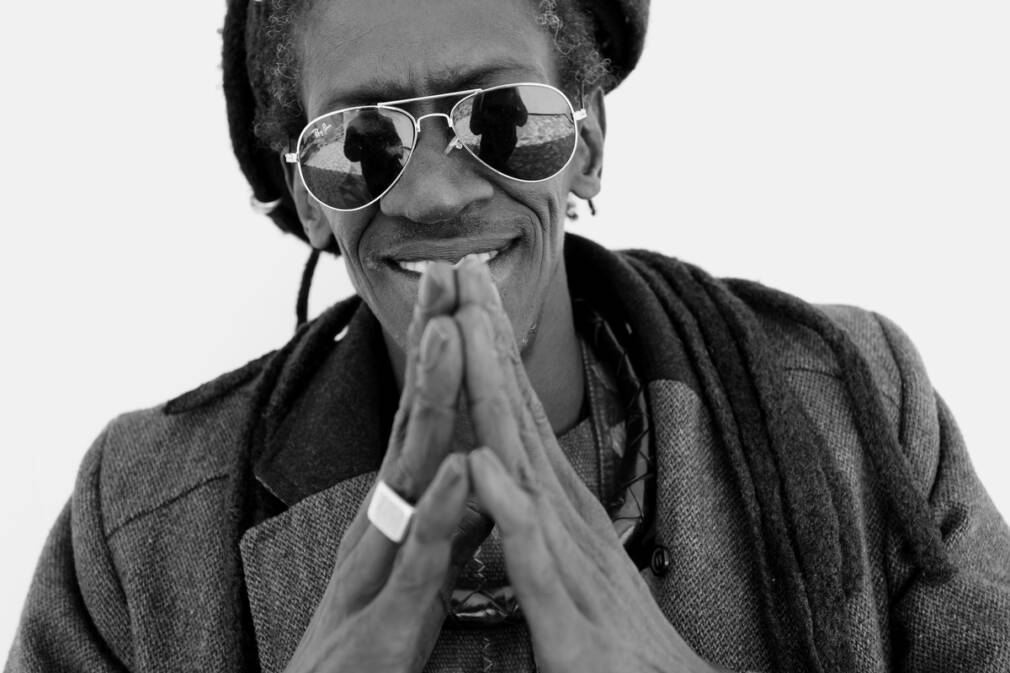Cheikh Lô often compares his music to the patchwork “Njaxas” clothing he wears as a member of the Baye Fall brotherhood. Like his Njaxas, Lô’s music has always been composed of many colours and textures, “a picnic basket” he quips – to share and take delight in – Whilst his faith to Senegalese Sufism has inspired his music since the release of his classic long player Né la thiass.
Translating as “gone in a flash” (a reference to the ephemerality of our lives in this world) Né la thiass was first released (outside of Senegal) by British label World Circuit in 1996, before getting a vinyl reissue for Record Store Day back in 2018 for which the original Senegalese cassette release was remastered. Cheikh followed up with the albums Bambay Gueej (1999) Lamp Fall (2005) the grammy-nominated Jamm (2010) and his most recent offering Balbalou in 2015, all of which explore spirituality with his trademark eclecticism. But with Né la thiass now pushing thirty and ageing like a good cheese in Cheikh’s picnic basket, let us concentrate on his mature debut.
Cheikh Ndigeul Lô was born in 1955 in Burkina Faso to Senegalese parents living in Bobo Dioulasso. Like many who came of age in the years following independence, Lô turned professional playing in one of the large orchestras that chicly expressed the optimism of the epoch. As a member of Orchestre Volta Jazz, Cheikh absorbed Cuban music alongside the rumba of Tabu Ley Rochereau and popular dance tunes of the day. Moving to Dakar in 1978 to work at the Cap-Vert Transport Company (SOTRAC) Cheikh furthered his musical education with Ousmane ‘Ouza’ Diallo at his residency at the Savana Hotel, before accompanying Papa Wemba to Paris in 1984 where he began working as a session drummer. During this period he met and impressed producer Ibrahima Sylla, appearing on three albums for the Syllart label. Cheikh longed to record his own music though, and eventually tired of the endless hustle of session work recalling of this time: “For two years my programme was studio, sleep, studio.”
Returning to Senegal he distilled his experiences in the diaspora into the song “Doxandeme” winning an award for best new talent and impressing Youssou N’Dour whose classic Immigres addressed the same concerns. N’Dour committed to producing Cheikh’s debut album and invited him to record it at his Xippi Studio in Dakar, recruiting musicians from his own Super Etoile Band to play on the record. And so with percussionists Assane Thiam and Mbaye Dieye Faye reinforcing the rhythm section and guitarist Oumar Sow arranging, the recording and mixing were completed in just nine days chez Youssou.
Beginning with “Boul di Tagale” (Let Lovers be) Né la thiass opens excitingly with a whistle and an accelerating guitar strum resembling a bus announcing its departure from Bobo Dioulasso’s bus station. Faye’s rapid fire sabar drumming and Thiam’s talkative tama answer Cheikh as he shouts out Burkina’s second city, whilst a flute (nostalgic of the Cuban music Cheikh absorbed with Volta Jazz) floats over a simmering opener that advocates for people to love who they wish. Next comes the titular “Né la thiass” on which Cheikh’s mournful voice with its incredible range from alto to falsetto is accompanied by his own lilting guitar and some jazzy saxophone played by Thierno Kouyate. The title track is a perfect example of how Senegalese mbalax rhythms can be served up with the Cuban melodic ostinato called a montuno. Counselling that each of our fates is in the hands of the creator, Cheikh sings:
“You can be going in a straight line
“Né la thiass” – Cheikh Lô
Sure of your direction
But along the way
Many things can happen”
The melancholic mood then lightens with “Ndogal” with it’s stabs of brass and bobbing mbalax rhythm. Cheikh sits behind the drum kit (as he does throughout the album and at live shows) and overdubs guitars on a song that translates as “If it pleases God.” One of two cuts to feature the producer’s vocals “Set” is the halfway point of the album and features the very complimentary voices of Youssou and Cheikh dueting. Written in response to a municipal strike taking place in Dakar at the time of the recording, “Set” (which means `cleanliness’ in Wolof) has Cheikh lamenting the rubbish that was piling up in the streets, and was later used by the Ministry of Health in a public sensitisation campaign.

Cheikh keeps things spiritual with “Cheikh Ibra Fall”, a song honouring the founder of the Baye Fall movement Cheikh Ibra Fall. A disciple of the father of Mouridism (Cheikh Amadou Bamba) Fall founded the Baye Fall movement which emphasises hard work as a form of religious service. With their aforementioned Njaxas worn as a rejection of vanity and waste, and locs known as “Ndiange” (strong hair) the Baye Fall live according to Fall’s exhortation to “Work as if you will never die, and pray to God as if you will die tomorrow” a piety Cheikh performs on Né la thiass each time he steps up to the microphone.
Cheikh continues praising his namesakes with “Bamba Sunu Goorgui” an ode to Cheikh Amadou Bamba – the top of the Mouride family tree and responsible for the Islamic renaissance that took place in Senegal in resistance to European colonisation. Featuring funky keyboards played by Ibrahima N’Dour and some super syncopated wolof vocals from Lô, “Bamba Sunu Goorgui” relates the story of how when Amadou Bamba was enroute to forced exile in Gabon and was prevented from praying on the boat, he walked on water and laid his prayer mat on the waves.
All too soon, and in a flash, Né la thiass concludes with “Guiss Guiss” a tribute to Lô’s marabout Maam Massoumba, who at the time of composition was reputedly over one hundred years old and the last living direct disciple of Cheikh Ibra Fall. A peaceful and suitably beatific closer, it features N’dour back for more backing vocals and Lô’s signature nylon string guitar on a hymn for tolerance. An album that documents a golden period of African music on compact disc and sounds as fresh today as ever, Né la thiass enters PAM’s canon of classic albums. “I carried the songs around in my bag for two years” Cheikh writes in the original liner notes, and indeed Né la thiass is the fruit of all he had learnt musically and spiritually up to that point.


